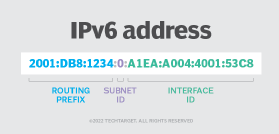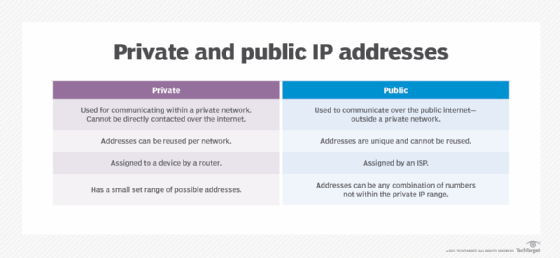A Private Ip Address Can Be Used to Send Data Over the Internet.
What is a individual IP address?
A private IP accost is a range of non-internet facing IP addresses used in an internal network. Private IP addresses are provided by network devices, such every bit routers, using network accost translation.
Cyberspace Protocol (IP) addresses place a device on either the net or a local network. IP addresses also enable information to be sent between devices on a network.
Individual IP addresses are normally used for local area networks in residential, office and enterprise areas. Every device that connects to an internet network -- such as computers, smartphones, tablets or printers -- volition have a private IP accost. Routers need a way to place these devices, and the devices may also need to identify each other, which is where private IP addresses come in. Individual IP addresses are generated by a router for identification.
Private IP addresses were originally designated to delay the exhaustion of IPv4 addresses -- i of the main types of IP addresses. Originally information technology was thought that IPv4's 32-bit IP addressing system -- with 4,294,967,296 theoretical IP addresses -- would be adequate for all purposes. Merely as more internet-connected devices were produced, it became apparent that something had to fill the gap between IPv4 and a future system. Private IP addressing and network address translation began filling that initial gap with a range of private IP addresses. Later, a new addressing organization, Internet Protocol Version half dozen (IPv6), was introduced. IPv6 increases IP address lengths from 32 $.25 to 128 bits and is 1,028 times larger than the number of IPv4 addresses.
Private addresses can be assigned by the router using the Dynamic Host Configuration Protocol or be manually set, subsequently which the addresses tin communicate with one some other through the router.
What is a private IP accost used for?
Private IP addresses are commonly used for residential and corporate networks, as the addresses cannot be seen exterior the private network. Net service providers (ISPs) may also classify a single routable IPv4 accost to residential customers. To translate that ane address to multiple addresses, and so multiple devices can have the assigned accost, a network address translator/port accost translator gateway is used. This method tin can connect multiple hosts.
Corporate networks use individual IP addresses for security, since they make it hard for an external host to connect to a system. Organizations also utilise individual IP addresses to restrict internet access to internal users, which helps increase security.
How tin can you check your individual IP address?
Well-nigh individuals do not need to know their IP address, but in some scenarios the knowledge comes in handy, such every bit when connecting a computer to another device on the network.
The steps for finding a device's IP accost differ by platform.
- Windows. Search for cmd in the Windows search bar, then in the control line prompt, type ipconfig to view the private IP address.
- Mac. Select system preferences, then click on network to view the private IP address.
- iPhone. Select settings. Become to Wi-Fi, tap the i that appears adjacent to the network information technology is connected on, and the IP address will display under the DHCP tab.
- Android. Select Settings, go to Virtually, tap on Status and the IP address should be visible.
Other devices can be checked from the connected router. The steps to practise this will differ by router, nevertheless.
What are the different individual IP accost ranges?
Private IP addressing uses both IPv4 and IPv6 addresses.
Private IPv4 addresses have the following class configurations:
- Class A IP addresses. Configurations range from x.0.0.0 to 10.255.255.255. This class is for big networks and has 8 bits for the network and 24 bits for hosts.
- Course B IP addresses. Configurations range from 172.16.0.0 to 172.31.255.255. This course is for medium networks and has 16 bits for the network and 16 bits for hosts.
- Class C IP addresses. Configurations range from 192.168.0.0 to 192.168.255.255. This class is for smaller networks and has 24 bits for the network and 8 bits for hosts.
The range of private IP addresses seems relatively minor because they tin be reused on dissimilar private networks without consequence. This differs from public IP addresses, which all need to be uniquely identifiable.

IPv6 private address ranges include the post-obit:
- fc00::/seven address block. These are reserved IP addresses from the Internet Assigned Numbers Authorisation for unique local addresses.
- fec0::/10 accost block. These are for deprecating site local addresses.
IPv6 addresses are written in hexadecimal, which uses 4 bits, meaning an IPv6 address is made upward of 32 hexadecimal digits. The numbers are grouped in fours, with a full of 8 blocks, or groups.
What are the differences between a individual and public IP address?
Both public and private IP addresses have attributes indicative of their roles. For instance, differences between public and private IP addresses include how individual IP addresses are used for communicating within a private network, or with other devices in a home network or function. They cannot be direct contacted over the internet. Meanwhile, public IP addresses are used to communicate over the public internet, outside a private network. Public IP addresses are unique and cannot be reused unlike private IP addresses, which can be reused. Individual IP addresses are assigned to a device by a router within the network, while an ISP assigns public IP addresses. In addition, public IP addresses can be any combination of numbers that practice not fall within individual IP address ranges.

Private IP addresses also have an extra layer of security because they are only located within private networks, and not to the internet as a public IP address would be.
Learn the differences between IPv4 and IPv6, and how many addresses IPv6 supports.
This was last updated in July 2021
Go along Reading About private IP accost
- How IPv6 networks create DNS configuration problems
- Agreement why IPv6 renumbering problems occur
- What should I know well-nigh IP address management systems?
- What's the difference between a MAC accost and IP address?
- The Block Busters: USC Researchers Find New Methods to Quantify IP Blocklisting
Source: https://whatis.techtarget.com/definition/private-IP-address#:~:text=Private%20IP%20addresses%20are%20provided,between%20devices%20on%20a%20network.
0 Response to "A Private Ip Address Can Be Used to Send Data Over the Internet."
Post a Comment